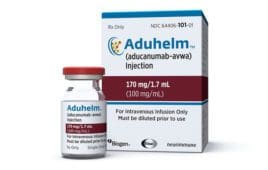 The HHS Office of Inspector General will review FDA’s accelerated approval pathway following the controversy surrounding the agency’s approval of the Alzheimer’s drug Aduhelm (aducanumab) from Biogen (NSDQ:BIIB) and Eisai (TYO:4523).
The HHS Office of Inspector General will review FDA’s accelerated approval pathway following the controversy surrounding the agency’s approval of the Alzheimer’s drug Aduhelm (aducanumab) from Biogen (NSDQ:BIIB) and Eisai (TYO:4523).
Among the controversies surrounding the drug’s approval is the use of the accelerated approval pathway, which led the agency to use a surrogate endpoint to approve aducanumab conditionally.
The HHS watchdog will investigate how the agency implements the accelerated pathway and will review “interactions between the FDA and outside parties as well as other aspects of the process, such as deciding on this pathway and scientific disputes,” HHS OIG said in a statement. In addition, the OIG will study FDA policies and procedures and the agency’s compliance with them. It will later make “appropriate findings and recommendations based on a sample of drugs approved using the accelerated approval pathway, which will include Aduhelm.”
FDA officials recently defended the use of the accelerated approval pathway in correspondence in NEJM, arguing that amyloid reduction is a “reasonably likely” surrogate.
Public Citizen applauded the news. “Such an independent review is long overdue,” said Dr. Michael A. Carome, director, health research group at Public Citizen. “We are particularly pleased that the OIG’s evaluation will include an examination of the interactions between the FDA and outside parties during the review and approval process of these drugs,” Carome added. “In the case of aducanumab, the unprecedented, inappropriately close collaboration between the FDA and Biogen before and after the company submitted its marketing application for the drug dangerously compromised the independence and objectivity of the agency’s review.”
Carome indicated that the Inspector General (IG) announcement had likely had little historic precedent. “My sense is that it is very unusual for the IG to evaluate the FDA’s review process for specific drug products,” Carome said. “I don’t recall a similar IG investigation, nor could I find records of such any similar investigation listed on the OIG website.”
The members of the FDA Peripheral and Central Nervous System Advisory Committee overwhelmingly concluded last November that there was insufficient evidence to approve aducanumab. Following the approval, three members of the committee have resigned.
Filed Under: Neurological Disease



